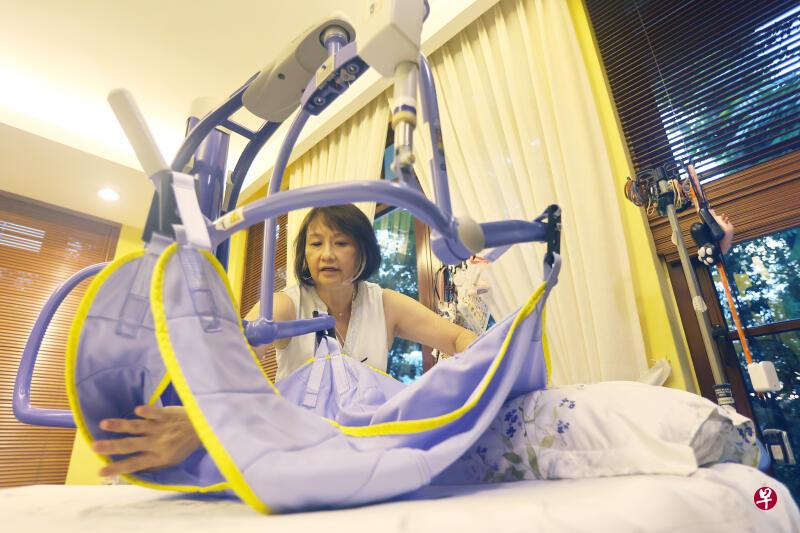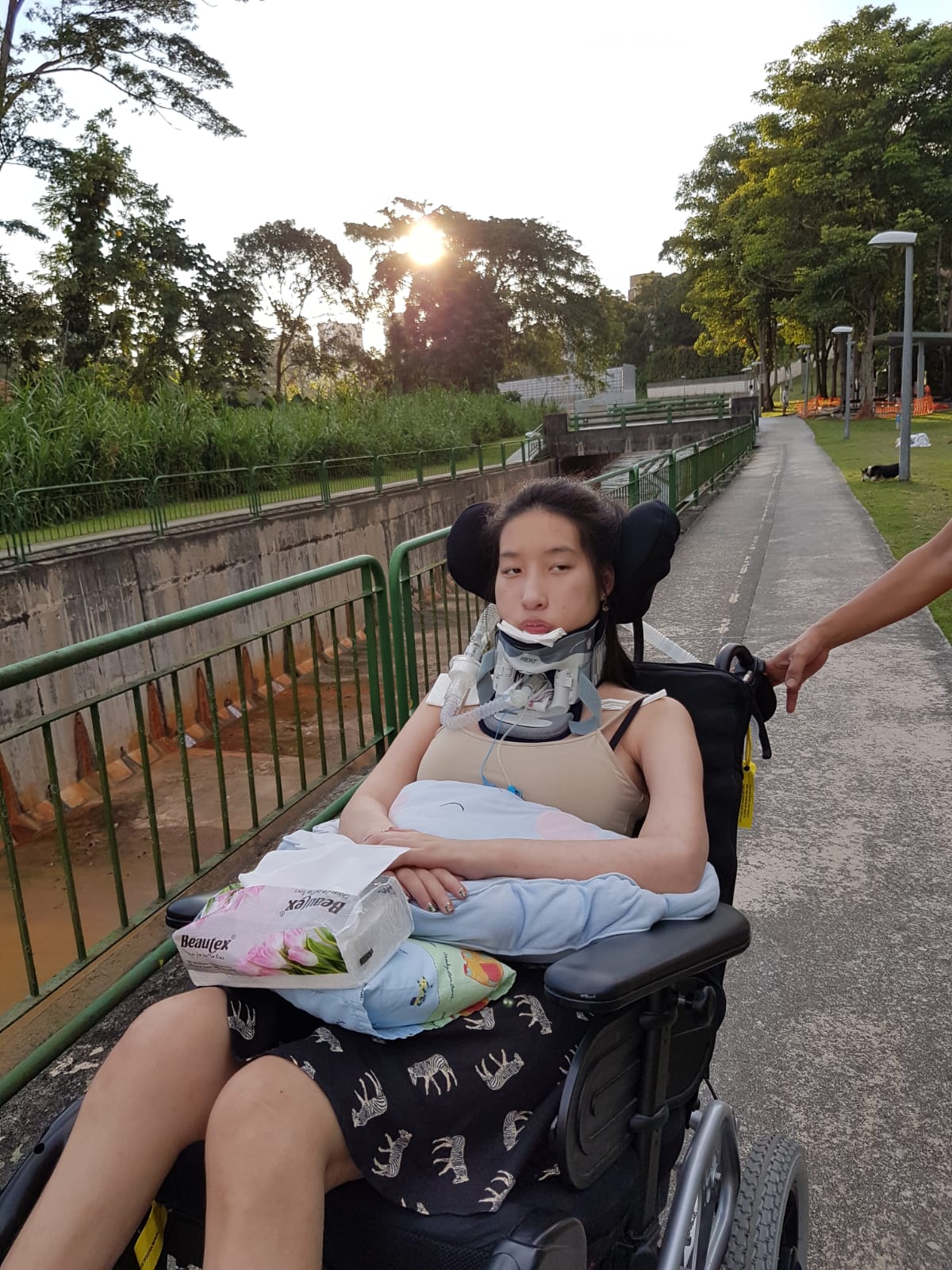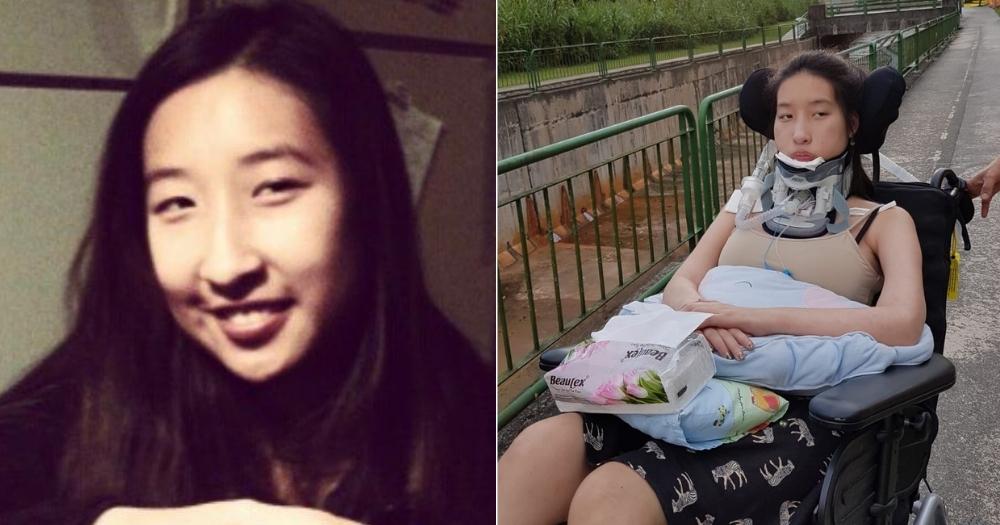Follow us on Telegram for the latest updates: https://t.me/mothershipsg
After 24-year-old Carolyn Chan Hui Yi was diagnosed with Amyotrophic Lateral Sclerosis (ALS) in 2014, her parents converted a bedroom in their family home into a domestic intensive care unit (ICU).
That was where Chan's parents provided 24-hour round-the-clock care for their ailing daughter, which lasted for the next eight years until her recent passing in March 2022.
Chan diagnosed with ALS at 24 in 2014
According to Chinese daily Shin Min Daily News', Chan started feeling unwell in 2014.
At that time, Chan was working as a social worker in Canada, where she completed her high school and university education.
 Image from Shin Min Daily News.
Image from Shin Min Daily News.
Chan's symptoms worsened progressively from her feeling ill to having difficulties swallowing and projecting her voice, and feeling her muscles weakening.
It was only after she lost a staggering 15kg within the span of a year that Chan was diagnosed with ALS.
ALS is a disease that attacks the neurons in the brain and spinal cord, which are responsible for voluntary muscle movement, and leads to a progressive loss in muscle control.
There is no cure for the disease currently.
Constructing an ICU within their home
Speaking to Shin Min, Chan's mother, Ginette Kwek, said her family was shocked and devastated when they learnt about Chan's diagnosis.
Kwek, a housewife, even flew to Canada to spend three months with Chan.
Upon her return to Singapore, Kwek consulted local doctors to seek a second opinion, but the outcome remained the same.
Despite this, Kwek said Chan remained optimistic, displayed resilience, and never once complained about the hand that she was dealt with.
Chan returned to Singapore, where she proactively sought treatment.
However, Kwek and her family did not want Chan to spend the rest of her life in the hospital.
This spurred them to convert a bedroom in their family home into an ICU unit, where they could personally care for Chan to the best of their abilities.
Round-the-clock care daily
The "ICU unit" was equipped with a ventilator, oxygen machine, phlegm suction pump machine, and other medical tools and furnished with a hospital bed, which was beside Kwek and her husband's bed.
At that time, Kwek said Chan's condition had deteriorated to a point where she had lost her motor skills.
She was no longer able to express herself and had to be tube-fed and relied on a ventilator to breathe.
Kwek and her husband, with the help of their domestic worker, took shifts monitoring Chan's vitals round the clock.
This involved checking on Chan every 15 minutes in the day and only going to bed in the wee hours of the morning.
Even while in their sleep, Kwek and her husband remained on high-alert and would climb out of bed when they heard the oximeter beep.
While she had ALS, Chan's cognitive functions were not impaired, and on good days, Kwek and her family would bring Chan out for a movie, a meal, or a leisurely stroll with Chan's medical equipment in tow.
Kwek and her husband kept up with these activities despite the fact that getting Chan out of bed and into her wheelchair was a three-man effort, even with the assistance of a machine hoist.
 Kwek demonstrating how she used the hoist. Image from Shin Min Daily News.
Kwek demonstrating how she used the hoist. Image from Shin Min Daily News.
 Image from Shin Min Daily News.
Image from Shin Min Daily News.
Chan cognisant, communicated with family while she could
Chan would communicate with Kwek and her family through an electronic device, and Kwek said her daughter would use the device to say "Goodnight" and "I love you" nightly.
However, as time went on, Chan had to communicate with her family through moving her eyeballs to signal her thoughts.
By that time, she had lost control of the muscles around her eyes and was no longer able to raise her eyelids.
In response to her family's questions, Chan would move her eyeballs up and down, which meant, "Yes".
But Chan's intentions may not always be immediately apparent, and Kwek said they had to guess at what Chan was signalling sometimes as the years progressed.
Chan passed away on March 16, 2022
As Chan was unable to vocalise or express herself, Kwek and her family would sometimes only realise that Chan was in discomfort after they noticed tears falling from her eyes.
Kwek disclosed that while seeing Chan cry broke her and her family's heart, they put up a strong front and refused to let their emotions get ahead of them and, in turn, upset Chan.
Despite the fact that ALS had no cure presently, Kwek and her family never once gave up on caring for Chan since her diagnosis in 2014.
Chan passed away at the age of 33 at home surrounded by her family members on March 16, 2022.
Kwek hopes to raise awareness about ALS
Kwek said: "While ALS is a horrible disease, Chan took it in stride and remained positive. She passed away peacefully and with her family by her side, I believe she is in a better place now."
Through sharing about Chan's experience, Kwek said she hopes to raise awareness about ALS.
Kwek advised ALS patients who feel confused and worried to go to Motor Neurone Disease Association Singapore to seek information and consultation.
She also encouraged ALS patients to not lose hope, and said that with reasonable assistance and and adjusted mentality it is still possible for patients to slow down the terminal disease.
To visit the Motor Neurone Disease Association Singapore website, click here.
Follow and listen to our podcast here
Top image from Shin Min Daily News website
If you like what you read, follow us on Facebook, Instagram, Twitter and Telegram to get the latest updates.
